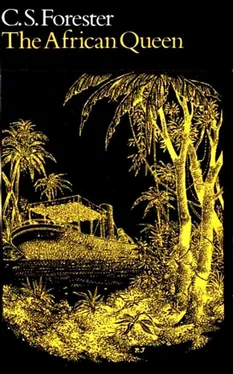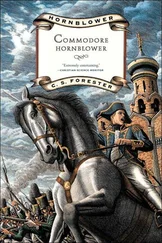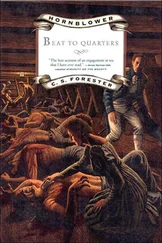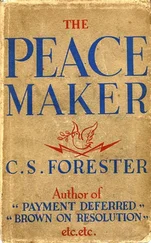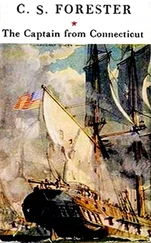Yet it was a very significant lesson in sea power that the bare mention of the name of the Königin Luise was sufficient to convince two people with a wide experience of the country, like Rose and Allnutt, of the impregnability of German Central Africa on the side of the Congo. No invasion whatever could be pushed across the Lake in the face of a hundred-ton steamer with a six-pounder popgun. Germany ruled the waters of the Lake as indisputably as England ruled those of the Straits of Dover, and the advantage to Germany which could be derived from this localized sea power was instantly obvious to the two in the launch.
‘If it wasn’t for the Louisa,’ said Allnutt, ‘there wouldn’t be no trouble here. Old von ’Anneken couldn’t last a month if they could get at ’im across the Lake. But as it is—’
Allnutt’s gesture indicated that, screened on the other three sides by the forest, von Hanneken might prolong his resistance indefinitely. Allnutt tapped his cigarette with his finger so that the ash fell down on his dirty white coat. That saved the trouble of detaching the cigarette from his lip.
‘But all this doesn’t get us any nearer ’ome, does it, miss? But b—bless me if I can fink what we can do.’
‘We must do something for England,’ said Rose, instantly. She would have said, ‘We must do our bit,’ if she had been acquainted with the wartime slang which was at that moment beginning to circulate in England. But what she said meant the same thing, and it did not sound too melodramatic in the African forest.
‘Coo!’ said Allnutt.
His notion had been to put the maximum possible distance between himself and the struggle; he had taken it for granted that this war, like other wars, should be fought by the people paid and trained for the purpose. Out of touch with the patriotic fervour of the Press, nothing had been farther from his thoughts than that he should interfere. Even his travels, which had necessarily been extensive, had not increased his patriotism beyond the point to which it had been brought by the waving of a penny Union Jack on Empire Day at his board school; perhaps they had even diminished it—it would be tactless to ask by what road and for what reason an Englishman came to be acting as a mechanic-of-all-work on a Belgian concession in a German colony; it was not the sort of question anyone asked, not even missionaries or their sisters.
‘Coo!’ said Allnutt again. There was something infectious, something inspiring, about the notion of ‘doing something for England’.
But after a moment’s excitement Allnutt put the alluring vision aside. He was a man of machinery, a man of facts, not of fancies. It was the sort of thing a kid might think of, and when you came to look into it there was nothing really there. Yet, having regard to the light which shone in Rose’s face it might be as well to temporize, just to humour her.
‘Yerss, miss,’ he said, ‘if there was anyfink we could do I’d be the first to say we ought ter. What’s your notion, specially?’
He dropped the question carelessly enough, secure in his certainty that there was nothing she could suggest—nothing, anyway, which could stand against argument. And it seemed as if he were right. Rose put her big chin into her hand and pulled at it. Two vertical lines showed between her thick eyebrows as she tried to think. It seemed absurd that there was nothing two people with a boat full of high explosive could do to an enemy in whose midst they found themselves, and yet so it appeared. Rose sought in her mind for what little she knew about war.
Of the Russo-Japanese war all she could remember was that the Japanese were very brave men with a habit of shouting ‘Banzai!’ The Boer war had been different—she was twenty then, just when Samuel had entered the ministry, and she could remember that khaki had been a fashionable colour, and that people wore buttons bearing generals’ portraits, and that the Queen had sent packets of chocolate to the men at the Front. She had read the newspapers occasionally at that time—it was excusable for a girl of twenty to do that in a national crisis.
Then after the Black Week, and after Roberts had gained the inevitable victories, and entered Pretoria, and come home in triumph, there had still been years of fighting. Someone called de Wet had been ‘elusive’—no one had ever mentioned him without using that adjective. He used to charge down on the railways and blow them up.
Rose sat up with a jerk, thinking at first that the inspiration had come. But next moment the hope faded. There was a railway, it was true, but it ran from a sea which was dominated by England to the head of navigation on the Ulanga at Limbasi. It would be of small use to the Germans now, and to reach any bridge along it she and Allnutt would have to go upstream to Limbasi, which might still be in German hands, and then strike out overland carrying their explosives with them, with the probability of capture at any moment. Rose had made enough forest journeys to realize the impossibility of the task, and her economical soul was pained at the thought of running a risk of that sort for a highly problematical advantage. Allnutt saw the struggle on her face.
‘It’s a bit of a teaser, isn’t it, miss?’ he said.
It was then that Rose saw the light.
‘Allnutt,’ she said, ‘this river, the Ulanga, runs into the Lake, doesn’t it?’
The question was a disquieting one.
‘Well, miss, it does. But if you was thinking of going to the Lake in this launch—well, you needn’t think about it any more. We can’t, and that’s certain.’
‘Why not?’
‘Rapids, miss. Rocks an’ cataracts an’ gorges. You ’aven’t been there, miss. I ’ave. There’s a hundred miles of rapids down there. Why, the river’s got a different nime where it comes out in the Lake to what it’s called up ’ere. It’s the Bora down there. That just shows you. No one knew they was the same river until that chap Spengler—’
‘He got down it. I remember.’
‘Yerss, miss. In a dugout canoe. ’E ’ad half a dozen Swahili paddlers. Map making, ’e was. There’s places where this ’ole river isn’t more than twenty yards wide, an’ the water goes shooting down there like—like out of a tap, miss. Canoe might be all right there, but we couldn’t never get this ole launch through.’
‘Then how did the launch get here, in the first place?’
‘By rile, miss, I suppose, like all the other ’eavy stuff. ’Spect they sent ’er up to Limbasi from the coast in sections, and put ’er together on the bank. Why, they carried the Louisa to the Lake, by ’and, miss.’
‘Yes, I remember.’
Samuel had nearly got himself expelled from the colony because of the vehement protests he had made on behalf of the natives on that occasion. Now her brother was dead, and he had been the best man on earth.
Rose had been accustomed all her life to follow the guidance of another—her father, her mother, or her brother. She had stood stoutly by her brother’s side during his endless bickerings with the German authorities. She had been his appreciative if uncomprehending audience when he had seen fit to discuss doctrine with her. For his sake she had slaved—rather ineffectively—to learn Swahili, and German, and the other languages, thereby suffering her share of the punishment which mankind had to bear (so Samuel assured her) for the sin committed at Babel. She would have been horrified if anyone had told her that if her brother had elected to be a Papist or an infidel she would have been the same, but it was perfectly true. Rose came of a stratum of society and of history in which woman adhered to her menfolk’s opinions. She was thinking for herself now for the first time in her life, if exception be made of housekeeping problems.
Читать дальше
